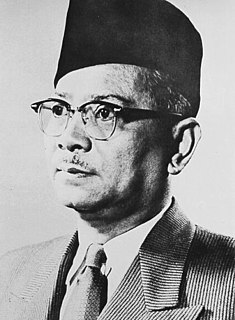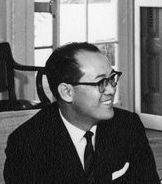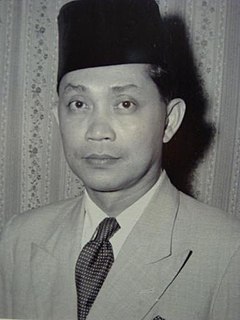
Politics of Malaysia takes place in the framework of a federal representative democratic constitutional monarchy, in which the Yang di-Pertuan Agong is head of state and the Prime Minister of Malaysia is the head of government. Executive power is exercised by the federal government and the 13 state governments. Legislative power is vested in the federal parliament and the 13 state assemblies. The judiciary is independent of the executive and the legislature, though the executive maintains a certain level of influence in the appointment of judges to the courts.

The Malaysian Indian Congress is a Malaysian political party. It is one of the founding members of the coalition Barisan Nasional, previously known as the Alliance, which was in power from when the country achieved independence in 1957 until the elections in 2018. The party was among the first to fight for Malayan Independence and is one of the oldest parties in Malaysia.

The Federation of Malaya was a federation of what previously had been British Malaya comprising eleven states that existed from 1 February 1948 until 16 September 1963. The Federation became independent on 31 August 1957, and in 1963, Malaysia was formed when the federation united with the Singapore, North Borneo, and Sarawak Crown Colonies.

The United Malays National Organisation, abbreviated UMNO or lesser-known as PEKEMBAR, is a political party in Malaysia. As the oldest continuous national political party within Malaysia, UMNO has once been called Malaysia's "Grand Old Party". UMNO is a founding and the principal dominant member of the Barisan Nasional (BN) coalition, which taken along with its predecessor Alliance, had been the main governing party of Malaysia from the independence of Malaya in 1957 until its defeat in the 2018 general election. From 1957 to 2018, every Prime Minister of Malaysia was also the President of UMNO. It has since returned to power twice as a result of the 2020-2022 Malaysian political crisis, firstly as a partner in a Perikatan Nasional-led government and subsequently as the leading party in a BN-led government with UMNO vice-president Ismail Sabri serving as Prime Minister.

The Parti Rakyat Malaysia is a political party in Malaysia. Established on 11 November 1955 as Partai Ra'ayat, it is one of the older political parties in Malaysia and traces its pedigree to the anti-colonial movements from the pre World War II period like the Kesatuan Melayu Muda.
The Reid Commission was an independent commission responsible for drafting the Constitution of the Federation of Malaya prior to Malayan independence from the United Kingdom of Great Britain and Northern Ireland on 31 August 1957.

General elections were held in Singapore on 30 May 1959. They were held under the new constitution and the first in which all 51 seats in the Legislative Assembly were elected. This was the first election victory for the People's Action Party (PAP), as they won a landslide victory with 43 seats, and the party has since remained in power after the elections.

Tun Thirunyanasambanthan s/o Veerasamy also known as V.T. Sambanthan, was a Malayan and Malaysian politician who served as Minister of National Unity from January 1972 to 1974, Minister of Works, Posts and Telecommunications from April 1956 to December 1971, Minister of Health from 1957 to 1959, Minister of Labour from 1955 to 1957, Member of Parliament (MP) for Sungai Siput from July 1955 to June 1973, acting Prime Minister on 3 August 1973 for only a day and 5th President of the Malayan Indian Congress and later Malaysian Indian Congress (MIC) from May 1955 to his removal from the party presidency in June 1973 by the party members. He is widely known as one of the founding fathers of Malaysia representing one of the three main ethnicities, people of Indian origin along with Tunku Abdul Rahman representing Malay ethnicity and Tan Cheng Lock representing the Chinese ethnicity.

The Government of Malaysia, officially the Federal Government of Malaysia, is based in the Federal Territory of Putrajaya with the exception of the legislative branch, which is located in Kuala Lumpur. Malaysia is a federation of 11 states of Peninsular Malaysia, Sabah, Sarawak and 3 Federal Territories operating within a constitutional monarchy under the Westminster system and is categorised as a representative democracy. The federal government of Malaysia adheres to and is created by the Federal Constitution of Malaysia, the supreme law of the land.

General elections were held in the Federation of Malaya on Wednesday, 27 July 1955, the only general election before independence in 1957. They were held to elect members of the Federal Legislative Council, whose members had previously been fully appointed by the British High Commissioner. Voting took place in all 52 federal constituencies, each electing one member. State elections also took place in all 136 state constituencies in nine states of Malaya and two settlements from 10 October 1954 to 12 November 1955, each electing one councillor to the State Council or Settlement Council.

The Labour Party of Malaya was a political party in Malaya that was active between 1952 and 1969. It was originally formed as a confederation of state based labour parties known as the Pan-Malayan Labour Party (PMLP).

The Alliance Party was a political coalition in Malaysia. The Alliance Party, whose membership comprised United Malays National Organisation (UMNO), Malaysian Chinese Association (MCA) and Malaysian Indian Congress (MIC), was formally registered as a political organisation on 30 October 1957. It was the ruling coalition of Malaya from 1957 to 1963, and Malaysia from 1963 to 1973. The coalition became the Barisan Nasional in 1973.

Tun Omar Ong Yoke Lin was a Malaysian politician, diplomat and businessman. He was a founding member of the Malaysian Chinese Association, and was a key figure in the country's road to independence. Ong served various positions in the government of Malaya and Malaysia, as a Cabinet minister and ambassador.
The foundation of the Constitution of Malaysia was laid on 10 September 1877. It began with the first meeting of the Council of State in Perak, where the British first started to assert their influence in the Malay states. Under the terms of the Pangkor Engagement of 1874 between the Sultan of Perak and the British, the Sultan was obliged to accept a British Resident. Hugh Low, the second British Resident, convinced the Sultan to set up advisory Council of State, the forerunner of the state legislative assembly. Similar Councils were constituted in the other Malay states as and when they came under British protection.
Raja Tun Uda Al-Haj bin Raja Muhammad was a Malaysian statesman during the country's struggle for independence and its early years of nationhood. He was a civil servant under the British colonial administration, and eventually rose to important administrative positions within the government. Upon the independence of Malaya in 1957, he became the first Yang di-Pertua Negeri (Governor) of Penang, one of the four states in Malaysia without a hereditary ruler.

Tun Sir Henry Lee Hau Shik, also known as H.S. Lee, was a Malaysian politician and businessman who served as the Minister of Finance and Minister of Transport under former Chief Minister and former Prime Minister Tunku Abdul Rahman from August 1955 to August 1959 and in between, Federation of Malaya gained independence from Britain in August 1957. He co-founded the Malaysian Chinese Association (MCA) and Alliance Party (Alliance), predecessor of Barisan Nasional (BN). He was also a member of the Merdeka mission to London and the only Chinese signatory of the Malayan independence agreement with Britain. He was the only major leader of the independence movement not born in Malaya, instead, he was born in the British Hong Kong.

Nik Ahmad Kamil bin Nik Mahmud was a Malaysian politician who played an active role during the country's road to independence. A prominent member of the United Malays National Organisation (UMNO) in the state of Kelantan, he served as the fourth Speaker of the Dewan Rakyat, the lower house of the Malaysian Parliament.

The Malaysia Agreement or the Agreement relating to Malaysia between United Kingdom of Great Britain and Northern Ireland, Federation of Malaya, North Borneo, Sarawak and Singapore (MA63) was the agreement which combined North Borneo, Sarawak, and Singapore with the existing states of the Federation of Malaya, the resulting union being named Malaysia. Singapore was later expelled from Malaysia, becoming an independent state on 9 August 1965.
In 1955, a general election was held for the first time. 52 seats were contested, with the majority party earning the right to appoint seven more. In the election, the Alliance Party contested all 52 seats and won 51, while the Pan-Malayan Islamic Party won the remaining seat. Following the elections, Raja Uda Raja Muhammad was elected as the Speaker of the Council, similar to the present Speaker of the Dewan Rakyat.
The Constitution of Penang, introduced in 1957, is the fundamental law of the Malaysian state of Penang. The constitution, which came into effect just before the independence of the Malayan Federation from the British Empire, concerns the formation and proceedings of the state government. It also establishes the Governor as the head of state who acts in the discretion of the Chief Minister, the head of government.













